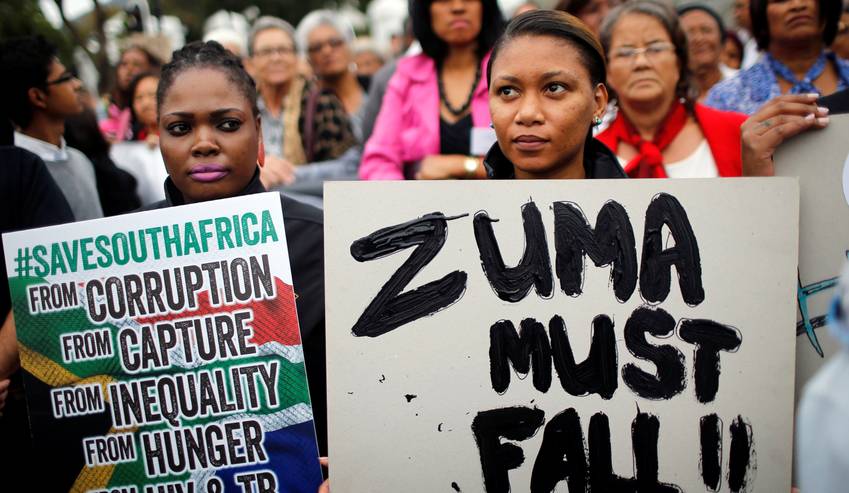The protests against South African president Jacob Zuma have gathered momentum as thousands of ant-corruption protesters marched on Wednesday.
Reuters reports that the African National Congress will pick its next leader in December with Deputy President Cyril Ramaphosa expected to face off against Nkosazana Dlamini-Zuma, the former chair of the African Union and Zuma’s ex-wife.

The government of Jacob Zuma has been described as ‘scandal plagued’ by many and the Congress of South African Trade Unions (COSATU), which has backed Ramaphosa and operates in an alliance with the ANC, led marches in major cities across South Africa to demand Zuma’s resignation
Though the demonstrations were supposed to be against corruption, it became apparent protesters had come to vent their anger at Zuma and throw support behind his rivals.
Throngs of protesters marched to parliament in Cape Town singing songs and waving “Zuma must go” placards, although the crowds never got close to the tens of thousands promised by COSATU.
“Things are just going down under President Zuma,” textile worker Florence Titus told Reuters.
“He needs to play a president’s role not just be there to fill his pockets and his family’s pockets. He must step down.”
Senior members of the ANC have also called for Zuma to quit in recent months following a swell of allegations that his friends, the Gupta family, wield undue influence over the award of state contracts worth hundreds of millions of dollars.

The Guptas and Zuma deny wrongdoing and say they are victims of a politically-motivated witchhunt.
Zuma survived an attempt in parliament to force him from office in August, but was left politically wounded after some ANC members backed the opposition’s no-confidence motion.
He can remain head of state until a parliamentary election in 2019, although the next ANC leader could edge him out next year.
FACTIONS
Allegations of widespread corruption and the raiding of taxpayer funds by outside interests – known locally as ‘state capture’ – have further dented investor confidence in an economy which fell into a recession earlier in 2017.
“We are marching against state capture. We are fighting the Guptas who are taking our money,” Ongeziwe Sisilana, a 26 year old teacher, said as she walked with around two thousand others in downtown Johannesburg.
Sisilana held up a sign reading “State Capture is a criminal offense” while some in the relaxed crowd swigged from beer cans as idle police cordons watched on.
Ramaphosa’s camp has prioritised fighting corruption, boosting economic growth and winning back the trust of supporters who have become disillusioned with the party under Zuma.
Zuma’s faction, backed by a powerful patronage network, is likely to throw its weight behind Dlamini-Zuma, although other candidates could still come into contention.
“Wednesday’s series of marches and protests that target corruption and state capture are also targeting Mr Zuma and his succession faction in the ANC,” said Gary van Staden, political analyst at NKC Research.
Some analysts say an opposition coalition could unseat the ANC at the next election, an unthinkable scenario a few years ago for a party that has led comfortably since it swept to power under Nelson Mandela at the end of apartheid in 1994.
